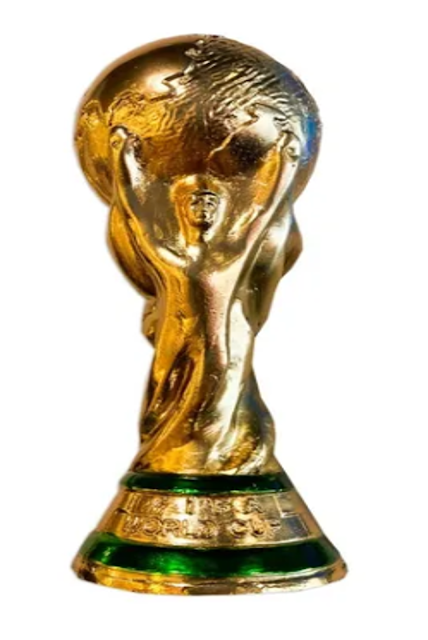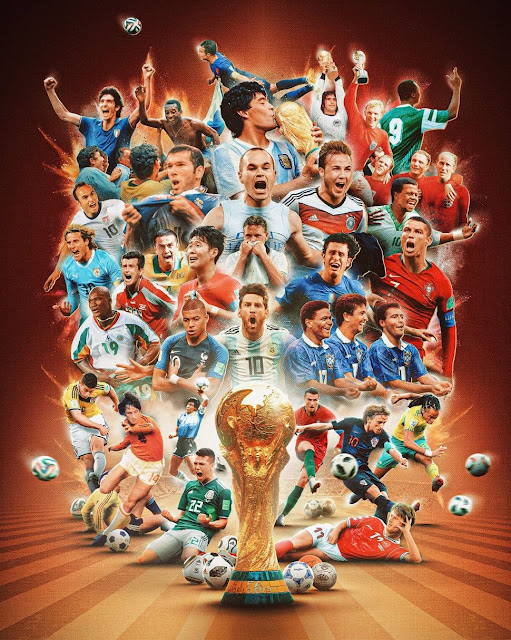Vocabulario football - soccer - fútbol
 |
| FIFA World Cup |
1) A match: two teams playing against each other in a 90-minute game of football.
2) A referee: the person who makes sure that the players follow the rules. Normally wears a black shirt and shorts, and has a whistle
3) A linesman (referee's assistant): the person whose main duty it is to indicate with a flag when the ball has gone out of play or when a player is offside.
4) A goalkeeper: the player in goal who has to stop the ball from crossing the goal line. The only player who is allowed to handle the ball during open play.
5) A defender: a player who plays in the part of the football team which tries to prevent the other team from scoring goals, e.g. 'Kolo Touré is a defender and plays in defence for Arsenal and Ivory Coast'.
6) A midfielder: a player who plays mainly in the middle part of the pitch (or midfield), e.g. Michael Essien is a midfielder and plays in midfield for Chelsea and Ghana.
7) An attacker also called a forward; a player whose duty it is to score goals, e.g. Samuel Eto'o is an attacker and plays in attack for Barcelona and Cameroon.
8) A substitute: a player who sits on the bench ready to replace another team-mate on the pitch. Can also be used as a verb, e.g. the manager was not happy with his attacker and substituted him after 60 minutes.
9) A manager: the person in charge of a team and responsible for training, new players and transfers. For example, Alex Ferguson is the manager of Manchester United.
10) A foul: a violation of the rules. For example, if a player other than the goalkeeper handles the ball in the penalty box (or penalty area) it is a foul and a penalty is given to the other team.
11) A booking: a yellow card shown to a player by the referee for a serious foul. Two bookings or yellow cards result in a red card or sending-off.
12) Full-time:The point of the game when the referee blows the final whistle and the match is over. Normally after 90 minutes and any added injury or stoppage.
13) Time injury: time also called stoppage time, added minutes at the end of the regular playing time at half-time or full-time. Entirely at the referee's discretion and normally indicated by an official on the sideline (or touchline).
Extra time: if a match has no winner at full-time, 2 x 15 minutes of extra time may be played in some competitions.
14) The final score: is the result that decides who has won the match . Can also be used as a verb, e.g. the attacker scored a beautiful goal to concede to allow a goal in, the opposite of scoring a goal. For example, Ghana conceded only four goals in the World Cup qualifying group 2
15) A goal: a successful attempt at scoring achieved by putting the ball over the goal line into the goal past the goalkeeper. For example, Gyan Asamoah has scored a beautiful goal for Ghana.
16) An own goal: a goal scored accidentally by a member of the defending team that counts in favour of the attacking team the lead when a team scores first it is "in the lead", i.e. winning the match at the point of scoring. For example, Fabrice Akwa's early goal gave Angola the lead after 72 minutes but the final score was 1-1 (one all).
17) An equaliser: a goal that cancels out the opposing team's lead and leaves the match tied or drawn. Can also be used as a verb, e.g. Marouan Chamakh equalised for Morocco after 40 minutes and brought the score level.
18) To win a match in which a team is victorious and beats the other team. A win normally gives the winning team three points, the losing team does not get any points. More commonly used as a verb, e.g. Brazil won the World Cup in 2002 a draw a match that ends in a tie, i.e. has no winner or loser. The teams get one point each for a draw. Can also be used as a verb, e.g. Congo drew 0-0 (nil all) with Senegal in June a defeat
19) A match that is lost, the opposite of a win. For example, Sudan suffered a home defeat to Zambia in September 2002.
20) To knock out: to eliminate another team from a competition. For example, in the last World Cup Brazil knocked out England in the quarter-finals a penalty shoot-out in a knock-out competition.
 21) A penalty shoot-out takes place if a match is a draw after full-time or extra-time. Five players from each team take a penalty each, and if the score is still level after that, one player from each team takes a penalty in turn, in order to decide who wins the match
a goal difference
If team A has scored four goals and team B one, the goal difference is three
a head-to-head
a way of deciding which team is ranked higher if two teams are level (or equal) on points. For example, if teams A and B both have six points, but team A beats team B in the head-to-head game, team A will be ranked above team B
in play-off
an extra match to decide which of two or more teams should go through to the next round. For example, Australia beat Uruguay on penalties in a play-off to qualify for the World Cup 2006.
21) A penalty shoot-out takes place if a match is a draw after full-time or extra-time. Five players from each team take a penalty each, and if the score is still level after that, one player from each team takes a penalty in turn, in order to decide who wins the match
a goal difference
If team A has scored four goals and team B one, the goal difference is three
a head-to-head
a way of deciding which team is ranked higher if two teams are level (or equal) on points. For example, if teams A and B both have six points, but team A beats team B in the head-to-head game, team A will be ranked above team B
in play-off
an extra match to decide which of two or more teams should go through to the next round. For example, Australia beat Uruguay on penalties in a play-off to qualify for the World Cup 2006.22) To kick: to hit something, or somebody, with your foot. In football, the players kick the ball.
25) A goal-kick: a kick taken from the 6-yard line by the defending team after the ball has been put over the goal line by the attacking team.
26) A free-kick: the kick awarded to a team by the referee after a foul has been committed against it.
30) Offside: is a position which is not allowed by the rules of the game, i.e. when an attacking player is closer to the opposing team's goal-line at the moment the ball is passed to him or her than the last defender.
31) A skipper: the player who leads a team, also called the captain.
Lo que leerás en la prensa y escucharás de comentaristas deportivos:
1) One-touch football: an often admiring reference to a style of football in which a team can pass the ball quickly from one player to another without the need to control it with more than one touch, the long-ball game an often disapproving reference to a style of football in which a team prefers.
2) To play long balls: in the hope that an attacking player will get them, flick them on or score keep possession to be able to keep the ball and prevent the opposing team from touching it.
3) "lose possession" or "give the ball away" they are dangerous on the counter-attack referring to a team that can switch quickly from defence to attack and score goals in that way put eleven men behind the ball referring to a team that defends with all the players and is not very interested in scoring goals. For example, many visiting teams put eleven men behind the ball and are happy with a 0-0 draw when they play Real Madrid at the Bernabéu stadium.
4) Send the keeper the wrong way refers to the way in which a player can fool the goalkeeper and pretend to shoot at one side of the goal while the ball goes in another direction. This expression is used often during penalties a clinical finish refers to a well-placed, controlled shot from a scoring position that ends in a goal. For example, Tunisia's Hatem Trabelsi controlled the pass and scored with.
5) They are strong in the air: referring to a team that has a lot of (tall) players who can head the ball very well. As a result, they are strong in the air, may prefer the long-ball game, and score a lot of goals with headers while not conceding any or many headed goals themselves.
6) They have a big physical presence: referring to a team that has a lot of big and physically strong players and, as a result, prefers a very robust style of play. For example, Bolton Wanderers have a big physical presence and are a difficult team to beat in the Premiership the goalkeeper.
7) Is quick off his/her line referring to a goalkeeper who is fast and makes quick (and normally correct) decisions as to when to leave the goal in order to prevent an attacking player from reaching a pass or cross that shot stung.
8) The goalkeeper's palms: referring to a shot on a goal that is so hard that the goalkeeper might well have felt pain when he/she stopped it with his/her hands.
9) A prolific goal scorer referring to a player, normally a striker, who scores or has scored a lot of goals. For example, Henrik Larsson is a prolific goal scorer for Sweden
10) The foul earned him/her a suspension referring to a foul that is punished by a yellow or red card and results in the player being banned from playing in the next game(s). For example, the two-footed tackle earned the defender a suspension and he will miss the next game.
¿Te gustó esta información? Comparte con tus amigos en redes sociales aquí abajo.
Thank you!! 👇



